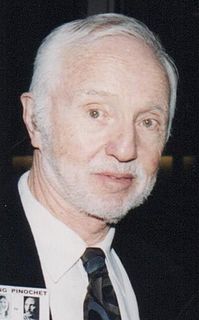April 11 is the 101st day of the year in the Gregorian calendar. 264 days remain until the end of the year.
January 27 is the 27th day of the year in the Gregorian calendar. 338 days remain until the end of the year.

Haskell County is a county located in the U.S. state of Kansas. As of the 2010 census, the county population was 4,256. Its county seat and most populous city is Sublette.
This article presents lists of the literary events and publications in 1881.
The Hoover Institution on War, Revolution, and Peace is an American public policy think tank and research institution located at Stanford University in California. It began as a library founded in 1919 by Stanford alumnus Herbert Hoover, before he became President of the United States. The library, known as the Hoover Institution Library and Archives, houses multiple archives related to Hoover, World War I, World War II, and other world history. According to the 2016 Global Go To Think Tank Index Report, Hoover is No. 18 in the "Top Think Tanks in the United States".

Charles Nathaniel Haskell was an American lawyer, oilman, and politician who was the first governor of Oklahoma. As a delegate to Oklahoma's constitutional convention in 1906, he played a crucial role in drafting the Oklahoma Constitution and gaining Oklahoma's admission into the United States as the 46th state in 1907. A prominent businessman in Muskogee, he helped the city grow in importance. He represented the city as a delegate in both the Oklahoma convention and an earlier convention that was a failed attempt to create a U.S. state of Sequoyah.

Haskell Wexler, ASC was an American cinematographer, film producer and director. Wexler was judged to be one of film history's ten most influential cinematographers in a survey of the members of the International Cinematographers Guild.
The MacArthur Fellows Program, MacArthur Fellowship, commonly but unofficially known as a "Genius Grant", is a prize awarded annually by the John D. and Catherine T. MacArthur Foundation typically to between 20 and 30 individuals, working in any field, who have shown "extraordinary originality and dedication in their creative pursuits and a marked capacity for self-direction" and are citizens or residents of the United States.
The general discussion of how to perform music from ancient or earlier times did not become an important subject of interest until the 19th century, when Europeans began looking to ancient culture generally, and musicians began to discover the musical riches from earlier centuries. The idea of performing early music more "authentically", with a sense of incorporating performance practice, was more completely established in the 20th century, creating a modern early music revival that continues today.
Time on the Cross: The Economics of American Negro Slavery (1974) is a book by the economists Robert Fogel and Stanley L. Engerman. Asserting that slavery was an economically viable institution that had some benefits for African Americans, the book was reprinted in 1995 at its twentieth anniversary. First published a decade after the landmark Civil Rights Act of 1964, the book contradicted contemporary assessments of the effects of slavery on African Americans in the American South before the Civil War. It attracted widespread attention in the media and generated heated controversy and criticism for its methodology and conclusions.

The 1943 New York state election was held on November 2, 1943, to elect the Lieutenant Governor and a judge of the New York Court of Appeals.

Haskell is a general-purpose, statically typed, purely functional programming language with type inference and lazy evaluation. Developed to be suitable for teaching, research and industrial application, Haskell has pioneered a number of advanced programming language features such as type classes, which enable type-safe operator overloading. Haskell's main implementation is the Glasgow Haskell Compiler (GHC). It is named after logician Haskell Curry.
The Oklahoma Hall of Fame was founded by the Oklahoma Memorial Association, a group founded in 1927 by Anna B. Korn with the purpose of establishing the hall of fame. In the 1970s, the Hefner Mansion was donated to the association to house the exhibits and busts or portraits of the inductees, and the organization changed its name to the Oklahoma Heritage Association in 1971. It then moved into the former Mid-Continent Life Insurance building in Oklahoma City in 2007 where it is now part of the Gaylord-Pickens Museum. In 2015, the organization changed its name for the final time to the Oklahoma Hall of Fame, in order to better represent the goals and mission of the organization.
The Parade All-America Boys Basketball Team was an annual selection by Parade that nationally honored the top high school boys' basketball players in the United States. It was part of the Parade All-American series that originated with boys basketball before branching to other sports. Started by the Sunday magazine in 1957, it had been the longest ongoing selection of high school basketball All-Americans in the country at the time of its final selections in 2015. Many of the honorees went on to star as college and professional basketball players. As of March 2011, there were 162 Parade All-Americans that were playing in the National Basketball Association (NBA).
Thomas L. Haskell was an American historian. He joined the faculty of Rice University in 1970, and was the Samuel G. McCann Professor of History.
The 1928 Haskell Indians football team was an American football that represented the Haskell Institute during the 1928 college football season. In its second and final year under head coach John Webster Thomas, the team compiled a 5–4 record.
Haskell is a surname with several origins. The English surname derives from the Norman personal name Aschetil, áss meaning god and ketill meaning helmet. The Ashkenazic surname derives from the personal name Khaskl; the Yiddish form is Yechezkel. Related surnames include Askelson, Askin, Axtell, Hascall, Haskett, Haskin, Hasty, and MacAskill.
Thomas L. Haskell was an American journalist from Maine. Haskell worked covering marine news for Portland, Maine's the Eastern Argus newspaper from 1857 to 1920. In that year, he joined the Portland Press. He continued with the newspaper when the Argus and Press merged to form the Portland Press Herald and continued working until 3 months prior to his death in 1928.




